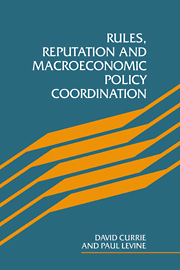Book contents
- Frontmatter
- Contents
- Acknowledgements
- Introduction
- Part I General issues
- Part II Theory and methodology
- 4 The design of feedback rules in linear stochastic rational expectations models
- 5 Credibility and time consistency in a stochastic world
- 6 Should rules be simple?
- 7 Macroeconomic policy design using large econometric rational expectations models
- Part III Fiscal and monetary policy in interdependent economies
- Bibliography
- Index
7 - Macroeconomic policy design using large econometric rational expectations models
Published online by Cambridge University Press: 03 December 2009
- Frontmatter
- Contents
- Acknowledgements
- Introduction
- Part I General issues
- Part II Theory and methodology
- 4 The design of feedback rules in linear stochastic rational expectations models
- 5 Credibility and time consistency in a stochastic world
- 6 Should rules be simple?
- 7 Macroeconomic policy design using large econometric rational expectations models
- Part III Fiscal and monetary policy in interdependent economies
- Bibliography
- Index
Summary
Introduction
This chapter examines a recurrent controversy in macroeconomics using the London Business School (LBS) model. Will attempts to stabilise either the real or nominal economy with monetary and fiscal feedback rules be effective? In considering this old debate we propose at the same time a general methodology for the design of macroeconomic policy using large, econometric rational expectations models.
Arguments against stabilisation policy range from the ‘long, variable and uncertain’ effects of monetary policy (Friedman, 1968) to the New Classical School twin propositions that only surprise inflation has real effects and that expectations are rational — which rules out the government exploiting surprise inflation.
Fully anticipated fiscal and monetary policy has both short-run and long-run real effects on the LBS model. These are described in section 2. The LBS model also assumes rational expectations in financial markets. This raises problems of credibility in the use of optimal control methods. How to address the ‘credibility problem’ whilst designing policy on a large econometric model is a central theme of the chapter.
The methodology begins by specifying a policy-maker's welfare loss function which penalises a discounted sum of deviations of target variables and instruments from some desired values over the future up to a terminal date. At this stage it is assumed that the exact specification of the welfare loss function is known; in section 4 a simple iterative process involving the policy-maker and designer of policy is simulated in which the preferences of the policy-maker are revealed.
- Type
- Chapter
- Information
- Rules, Reputation and Macroeconomic Policy Coordination , pp. 176 - 210Publisher: Cambridge University PressPrint publication year: 1993



